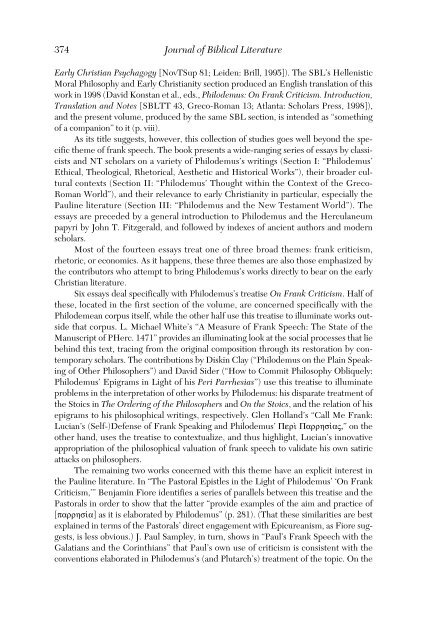Journal of Biblical Literature - Society of Biblical Literature
Journal of Biblical Literature - Society of Biblical Literature
Journal of Biblical Literature - Society of Biblical Literature
You also want an ePaper? Increase the reach of your titles
YUMPU automatically turns print PDFs into web optimized ePapers that Google loves.
374 <strong>Journal</strong> <strong>of</strong> <strong>Biblical</strong> <strong>Literature</strong><br />
Early Christian Psychagogy [NovTSup 81; Leiden: Brill, 1995]). The SBL’s Hellenistic<br />
Moral Philosophy and Early Christianity section produced an English translation <strong>of</strong> this<br />
work in 1998 (David Konstan et al., eds., Philodemus: On Frank Criticism. Introduction,<br />
Translation and Notes [SBLTT 43, Greco-Roman 13; Atlanta: Scholars Press, 1998]),<br />
and the present volume, produced by the same SBL section, is intended as “something<br />
<strong>of</strong> a companion” to it (p. viii).<br />
As its title suggests, however, this collection <strong>of</strong> studies goes well beyond the specific<br />
theme <strong>of</strong> frank speech. The book presents a wide-ranging series <strong>of</strong> essays by classicists<br />
and NT scholars on a variety <strong>of</strong> Philodemus’s writings (Section I: “Philodemus’<br />
Ethical, Theological, Rhetorical, Aesthetic and Historical Works”), their broader cultural<br />
contexts (Section II: “Philodemus’ Thought within the Context <strong>of</strong> the Greco-<br />
Roman World”), and their relevance to early Christianity in particular, especially the<br />
Pauline literature (Section III: “Philodemus and the New Testament World”). The<br />
essays are preceded by a general introduction to Philodemus and the Herculaneum<br />
papyri by John T. Fitzgerald, and followed by indexes <strong>of</strong> ancient authors and modern<br />
scholars.<br />
Most <strong>of</strong> the fourteen essays treat one <strong>of</strong> three broad themes: frank criticism,<br />
rhetoric, or economics. As it happens, these three themes are also those emphasized by<br />
the contributors who attempt to bring Philodemus’s works directly to bear on the early<br />
Christian literature.<br />
Six essays deal specifically with Philodemus’s treatise On Frank Criticism. Half <strong>of</strong><br />
these, located in the first section <strong>of</strong> the volume, are concerned specifically with the<br />
Philodemean corpus itself, while the other half use this treatise to illuminate works outside<br />
that corpus. L. Michael White’s “A Measure <strong>of</strong> Frank Speech: The State <strong>of</strong> the<br />
Manuscript <strong>of</strong> PHerc. 1471” provides an illuminating look at the social processes that lie<br />
behind this text, tracing from the original composition through its restoration by contemporary<br />
scholars. The contributions by Diskin Clay (“Philodemus on the Plain Speaking<br />
<strong>of</strong> Other Philosophers”) and David Sider (“How to Commit Philosophy Obliquely:<br />
Philodemus’ Epigrams in Light <strong>of</strong> his Peri Parrhesias”) use this treatise to illuminate<br />
problems in the interpretation <strong>of</strong> other works by Philodemus: his disparate treatment <strong>of</strong><br />
the Stoics in The Ordering <strong>of</strong> the Philosophers and On the Stoics, and the relation <strong>of</strong> his<br />
epigrams to his philosophical writings, respectively. Glen Holland’s “Call Me Frank:<br />
Lucian’s (Self-)Defense <strong>of</strong> Frank Speaking and Philodemus’ Peri; Parrhsiva",” on the<br />
other hand, uses the treatise to contextualize, and thus highlight, Lucian’s innovative<br />
appropriation <strong>of</strong> the philosophical valuation <strong>of</strong> frank speech to validate his own satiric<br />
attacks on philosophers.<br />
The remaining two works concerned with this theme have an explicit interest in<br />
the Pauline literature. In “The Pastoral Epistles in the Light <strong>of</strong> Philodemus’ ‘On Frank<br />
Criticism,’” Benjamin Fiore identifies a series <strong>of</strong> parallels between this treatise and the<br />
Pastorals in order to show that the latter “provide examples <strong>of</strong> the aim and practice <strong>of</strong><br />
[parrhsiva] as it is elaborated by Philodemus” (p. 281). (That these similarities are best<br />
explained in terms <strong>of</strong> the Pastorals’ direct engagement with Epicureanism, as Fiore suggests,<br />
is less obvious.) J. Paul Sampley, in turn, shows in “Paul’s Frank Speech with the<br />
Galatians and the Corinthians” that Paul’s own use <strong>of</strong> criticism is consistent with the<br />
conventions elaborated in Philodemus’s (and Plutarch’s) treatment <strong>of</strong> the topic. On the

















